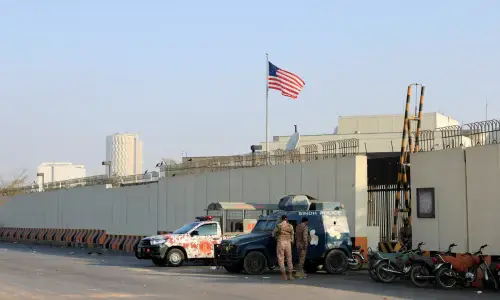
OF late, I have been studying Sri Lanka’s war experience. The country has fascinated students of comparative politics like me as it defies virtually all conventional wisdom about peace and conflict within societies.
Unlike the rest of South Asia, it checks several boxes typically associated with relatively peaceful outcomes for nations. It boasts a 90-plus per cent literacy rate. It is now formally a middle-income country — even when it wasn’t, it didn’t suffer from the kind of abject poverty typical of South Asia. Also, Sri Lanka has an aging population. The worry about scores of youth floating idly and turning to bad things wasn’t as pertinent, at least on paper.
Finally, the country’s majority is Buddhist — a pacifist religion at its core. Yet, it experienced brutal violence lasting decades. The LTTE-inspired insurgency introduced suicide bombing to the modern world and killed thousands. Less known but equally violent insurrections took place in the south of the country.
Sri Lanka’s experience throws out any number of lessons for peer countries, including Pakistan.
First, as significant as the conversation about quantity and quality of education is, Sri Lanka’s experience highlights a slightly different dimension: the bureaucracy and management of the education sector. The Sri Lankan education sector has produced three siloed youth cohorts by running parallel school systems catering to Sinhala, Tamil, and English-speaking kids. This represents both a linguistic and an ethnic faultline: the majority-Buddhist Sinhala who have ruled Sri Lanka since its independence vs the Tamil minority (mostly Hindus) who feel discriminated against by the Sinhala vs the English-speaking urban (mostly Colombo) elite.
Sri Lanka realises that ending a war doesn’t equal peace.
The result is that most of Sri Lanka’s young are mono-lingual and have grown up within their respective echo chambers. The literacy rate is combined with inherently polarised mindsets that live off stereotypes about the ‘other’, with no opportunity to form more informed opinions by interacting across these divides.
Second, hardly any other case provides a more obvious correlation between the politicisation of religion and its direct effect on societal discord and violence. As if Buddhism’s pacifist nature didn’t matter, Sri Lankan governments linked Sinhala nationalist chauvinism with a ‘Buddhism under siege’ mentality. Soon, it was none other than the Buddhist clergy leading the charge, justifying an anti-minority rhetoric, even violence, through scripture. Political violence was made holy, in a way not much different than much of the Muslim world.
Third, Sri Lanka provides an interesting insight into the socioeconomics and violence connection. Literature on the link between poverty and extremist violence is split, with most prominent voices still holding out on accepting a strong correlation. Yet, when one interacts with policy practitioners involved in counterterrorism in developing countries, one recognises their conviction that poverty is the number one driver of extremist violence.
In Sri Lanka’s case, absolute deprivation was lower than several other peer counties. But the island had serious disparities across its geographical regions, and its minority Tamil and Muslim communities harboured a sense of collective deprivation compared to the Sinhala-majority parts. It wasn’t as much about individual poverty and helplessness as it was about young men and women from minority communities feeling relatively deprived vis-à-vis the majority on behalf of their communities.
Finally, Sri Lanka is realising that ending a war doesn’t equal peace. It only represents a window of opportunity to begin to address the above-mentioned and many other deeper structural problems that caused the war in the first place.
Here is another fascinating reality. As I examine comparable cases, these trends quickly emerge as common themes across countries, including in South Asia. Pakistan is no exception. Our debates and solutions on education still tend to be more conventional than not. Lost amidst all the worries about extremist mindsets is the stratification of the education system and the acute disdain youth from across the elite private vs public vs madressah schools tend to have for each other.
Never do children from across these systems interact constructively with one another. The focus is on Islam’s role in statecraft rather than on calling out the gross misuse of religious dialect for an ultra-nationalist agenda. The question is how to get the majority to stop using faith as a tool to impose its will on the minority. It’s the same for us, the same for Sri Lanka, and the same for any other country with this problem.
Next, we need to examine the sense of collective deprivation across societal fault lines rather than only seeing these as anti-patriotic, externally inspired law-and-order problems.
Finally, we must recognise that while we have done fairly well in terms of cutting the Tehreek-i-Taliban Pakistan to size militarily, it is the performance on the non-kinetic aspects of the National Action Plan that will determine whether or not Pakistan can achieve sustainable peace.
The writer is a foreign policy expert based in Washington, DC.
Published in Dawn October 25th, 2016




























